 By Dr. James Taylor
By Dr. James Taylor
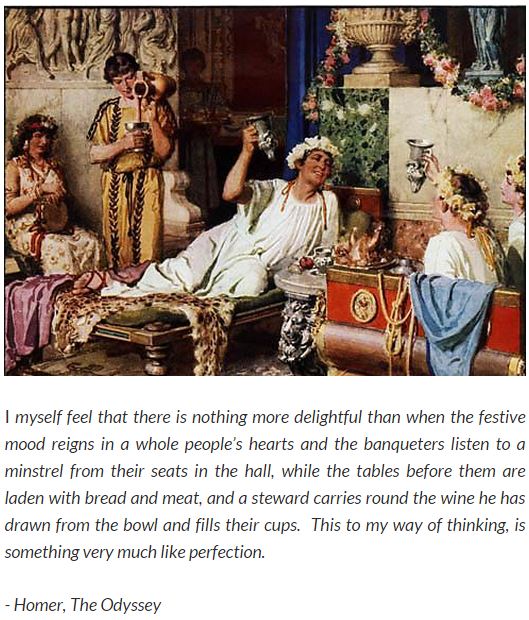 In an age when there are those still fortunate enough to enjoy the classical texts and ideas of Western civilization, generally they are also troubled about the various failures with current education. They usually believe that in the haste (and waste) of modern times we have neglected some essential wisdom from the past. I think that those lacking a familiar knowledge with the ancient and classical educational traditions of our past, also suspect the loss of some ancient wisdom that would turn out to be medicinal for our educational malaise. However, I would say that it is characteristic of both groups that in their concern and perhaps even in their zeal to address the problem of education, they fail to grasp the significance of that first and most influential “bible” of education- the epic poetry of Homer. When we do grasp this significance and importance of the poetic mode of knowledge, we begin to understand that our falling off in education has been greater than that which a “back to basics” approach will lift up. We are at a place where we have to first understand how basic those basics are. It is a distance from reality that has to be shortened, not really boosting dropping standardized test scores which, for the most part, are based on information, and not knowledge.
In an age when there are those still fortunate enough to enjoy the classical texts and ideas of Western civilization, generally they are also troubled about the various failures with current education. They usually believe that in the haste (and waste) of modern times we have neglected some essential wisdom from the past. I think that those lacking a familiar knowledge with the ancient and classical educational traditions of our past, also suspect the loss of some ancient wisdom that would turn out to be medicinal for our educational malaise. However, I would say that it is characteristic of both groups that in their concern and perhaps even in their zeal to address the problem of education, they fail to grasp the significance of that first and most influential “bible” of education- the epic poetry of Homer. When we do grasp this significance and importance of the poetic mode of knowledge, we begin to understand that our falling off in education has been greater than that which a “back to basics” approach will lift up. We are at a place where we have to first understand how basic those basics are. It is a distance from reality that has to be shortened, not really boosting dropping standardized test scores which, for the most part, are based on information, and not knowledge.
With the demise of authentic liberal arts colleges (which didn’t take long in America) where the best of the arts and sciences were read and studied and the best teachers emerged, bureaucratic teacher education departments came into being where teaching became a “specialty” somewhat set apart from the culture of general studies. Some of these, of course, were better than others- some much better. Yet, in hundreds, perhaps thousands, of “foundations of education” courses in these departments there was usually a glance, if that, at Plato to begin such a tour; then, a brief warm up with Aristotle’s Politics. After that exercise, too often read in the form of textbook commentaries and not the text itself, the syllabus would pitch the student quickly through a semester’s short season, a fast ball from the “dark ages” of medieval universities, a slow curve of the new freedom lifting from the Renaissance, then a hit and quick turn past post-Reformation influences, touch second base on the English schools, round third with New England colonial education, and, finally, the grand slam, as John Dewey brought home the victory of Pragmatism and the new thing called American Education.
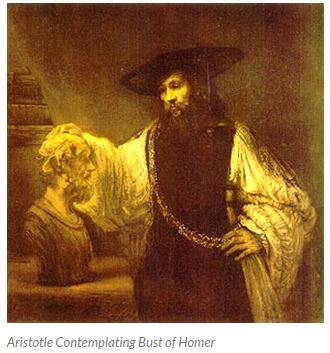 Now it is proper to read Plato and Aristotle concerning education, and all the rest mentioned in this baseball analogy, which, I promise, I will cease to extend. In fact, I will enlarge the scenario and say that even in the better courses in the foundations of education, where Plato, Aristotle, Cicero, Quintilian, St. Augustine, St. Thomas, and the rest in that defining tradition are read, it is commonplace that Homer is not included, much less recognized as the first educator of Greece, that is, of the Hellenistic world, and by extension, the Roman and Christian world. Without lengthening the argument with the use of historical documents and footnotes to prove this, I ask you to trust me, and trust the more thorough scholars of antiquity and education who give Homer his due mead of honor.
Now it is proper to read Plato and Aristotle concerning education, and all the rest mentioned in this baseball analogy, which, I promise, I will cease to extend. In fact, I will enlarge the scenario and say that even in the better courses in the foundations of education, where Plato, Aristotle, Cicero, Quintilian, St. Augustine, St. Thomas, and the rest in that defining tradition are read, it is commonplace that Homer is not included, much less recognized as the first educator of Greece, that is, of the Hellenistic world, and by extension, the Roman and Christian world. Without lengthening the argument with the use of historical documents and footnotes to prove this, I ask you to trust me, and trust the more thorough scholars of antiquity and education who give Homer his due mead of honor.
In fact, this isn’t an argument at all. It is a call from what has been our cultural memory, alas, now approaching, at best, amnesia, at worst, dementia. Homer, and the poets in general, were simply the keepers of what had been discovered as those things that inform the educated man: manners, prudence, courage, an alert emotional life, wit, meaningful and poetic speech, and, not least, piety. Nothing embedded these principles of the ends of education more firmly in the imagination of the polis than the sensory-emotional appeal of poetry. Of course, the opposites of these heroes were portrayed too-those lacking virtue, the gross, the barbarians-the Cyclops-and that was also the point, or how else would we know the model of the good man? Or woman. Think of the intelligence, grace, style, the “class”, the charm and virtues of Penelope.
Did the Greeks fall short of these ideals? Of course. But there has always been in the best of societies the determinate few, the elite class upon whose model the rest of society was measured. But not in our times. In an article in the Wall Street Journal, Charles Murray eloquently points out the obvious, that today those who are our elite have adopted the manners of the impious masses, the so-called underclass, leveling, through the power of their example, all society to the lowest common denominator. Such concerns as Murray’s have everything to do with the recovery of education, and it is obvious at least to me that we will begin not with a new model of education, but with an old one, yet ever new, seemingly dead, but breathing none the less, dormant in our cultural memory.
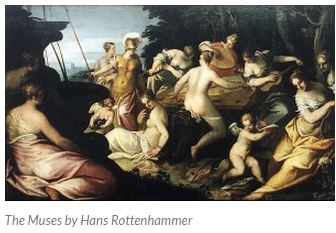 On this subject of poetic knowledge and education, what do we continue to find in that memory? In the first serious conversation about education in the West, Socrates says in the part of The Republic that deals with the education of the Guardians, that knowledge should begin with poetry. He means for this to begin at the age of the nursery, and has in mind, for example, Aesop, and the songs that mothers and nurses would likely sing to their babes. This is not what we might imagine as arranged “quality time” parents schedule in with their children along with the soccer games, music or dance lessons, and Mom and Dad’s jobs and business meetings. For Socrates, such poetic experience-rhyme, rhythm, images and metaphors-are an essential part of life, based on the observable emotional and psychological results that the Muse of the poem and story cultivates, namely, the senses of delight and wonder. These prepare in the child a sensory-cognitive sympathy for that movement from the known to the unknown. These first stages of education are an art that will form the human, emotionally and intellectually, whole and entire.
On this subject of poetic knowledge and education, what do we continue to find in that memory? In the first serious conversation about education in the West, Socrates says in the part of The Republic that deals with the education of the Guardians, that knowledge should begin with poetry. He means for this to begin at the age of the nursery, and has in mind, for example, Aesop, and the songs that mothers and nurses would likely sing to their babes. This is not what we might imagine as arranged “quality time” parents schedule in with their children along with the soccer games, music or dance lessons, and Mom and Dad’s jobs and business meetings. For Socrates, such poetic experience-rhyme, rhythm, images and metaphors-are an essential part of life, based on the observable emotional and psychological results that the Muse of the poem and story cultivates, namely, the senses of delight and wonder. These prepare in the child a sensory-cognitive sympathy for that movement from the known to the unknown. These first stages of education are an art that will form the human, emotionally and intellectually, whole and entire.
Then, the child is ready to advance to Homer. In spite of the fact that Socrates has much to censor in the Odyssey and Iliad, namely, those portions that represent the gods as deceivers and immoral, throughout all the dialogues Plato records Socrates quoting Homer and other poets as long-established authorities on all matters of wisdom. In other words, what we see is Socrates working naturally within a received tradition, from the poets. He knows Homer and the other poets by heart as did any educated Athenian. Difficult as it may be for us to grasp, for Socrates and his age the poets were the oracles who were the keepers of the permanent things, the Greek religion, all in delight, wonder, and wisdom. It may even be more difficult for us to grasp that Homer and the poets are just as important for us today.
Now this “way” of approaching education (for it is not a method), presupposes that the intellect by itself cannot be educated, an assumption often made by the most well intentioned and concerned of parents and educators. Does that sound contrary to what is generally considered the basis of a classical or liberal education? Consider this: You can force feed the intellect formulae and information drawn from a very high quality, to be sure; and students can become quite astute at regurgitating this back in a form that fits the demands of tests and examinations. But this method-and etymologically that is exactly what it is, a short cut-produces a kind of knowledge-in-a-vacuum that is bereft of understanding. How so? Because the intellect-that marvelous power that can see into the essence of things-is still dependent on the experience of direct or vicarious, imaginative objects upon which to gaze. And such sensory-emotional experiences have a cognitive value, no matter how obscure, upon which the intellect seizes. We are, after all, not really a body and a soul, we are a body-soul, a composite being, as the traditional philosophers and theologians say. The eyes do not simply see; they must see something. And we think about what we see. Likewise with all the exterior senses. These exterior sensory experiences, in turn, have an inner connection with our internal senses, our common sense, imagination, estimative sense, and our memory. Further, these have an emotional resonance, fear, joy, love, anger, that is, we say we feel one way or another about experience, and in so doing offer the will the opportunity to follow naturally the good or with effort to resist the evil, depending upon our knowledge of virtue, our habits, the light of the intellect informing all of these functions at all times.
 This means the higher powers of the soul are dependent upon, and integrated with our most basic perceptions of concrete reality. The child must first have the sensory knowledge of apples and oranges, trees and stones, before their intellect can properly rise to the abstraction that a thing called a number 1, plus another number 1, make 2. Not two concrete things any longer, but just two-of anything. If we can take ourselves back to our own childhood, we can recall what an intellectual leap that really is. Poetic knowledge, because it naturally responds to the sensory and emotional, is prerequisite to all higher studies, and requires sight, sound, feel and touch with the commensurate emotional resonance of wonder, of apples and trees, oranges and stones, and thus becomes connatural with these realities, effortlessly advancing to abstract principles. This is what Socrates learned from the poets and why he begins education (and actually ends his life) in the realm of poetry. He presupposed the presence of this intimate, intuitive knowledge of reality (obscure, by scientific standards), as did everyone afterward, peasant or philosopher, who lived in a pre-industrial, agrarian, craft culture.
This means the higher powers of the soul are dependent upon, and integrated with our most basic perceptions of concrete reality. The child must first have the sensory knowledge of apples and oranges, trees and stones, before their intellect can properly rise to the abstraction that a thing called a number 1, plus another number 1, make 2. Not two concrete things any longer, but just two-of anything. If we can take ourselves back to our own childhood, we can recall what an intellectual leap that really is. Poetic knowledge, because it naturally responds to the sensory and emotional, is prerequisite to all higher studies, and requires sight, sound, feel and touch with the commensurate emotional resonance of wonder, of apples and trees, oranges and stones, and thus becomes connatural with these realities, effortlessly advancing to abstract principles. This is what Socrates learned from the poets and why he begins education (and actually ends his life) in the realm of poetry. He presupposed the presence of this intimate, intuitive knowledge of reality (obscure, by scientific standards), as did everyone afterward, peasant or philosopher, who lived in a pre-industrial, agrarian, craft culture.
This presupposition accounts for the lack of formal, reflective commentaries on poetic knowledge in the pre-industrial past-it was simply a given. This is why Socrates begins speaking in media res about poetry as the place to begin education. Poetry, in addition to being delightful in itself, was the reflection and representation of the essence of the concrete that contained within its imaginative experience the shadow of the Good, the True, and the Beautiful. Only after a life lived in the balance of the poets and the realities of everyday experience, would Socrates lead the learner toward the light of the transcendental realities that are only grasped by the mind. Even then, it was understood, and exemplified in the persons of Socrates, Plato, Aristotle, Cicero, St. Augustine, and the tradition they continued, that poetry and its knowledge is something never outdone or surpassed.
If Socrates and the tradition of education that followed him for nearly 2,000 years held this “way” to be essential to education, then how much more important is it now in our age so grossly insulated from the real, so profanely exulting in the behavior of the impious, having replaced the True, Good, and Beautiful, with the False, Evil, and Ugly? For make no mistake, while not moralizing, or departing from some aspect of wonder, the poetic way of education is never separated from virtue. There must be virtue in this experience, for the poetic is at root the powerful love of something beautiful, “something very much like perfection”, and, having awakened this innate love, we all know how easy it is mistakenly to desire objects of our unhappiness, and destruction. Socrates says in several different ways in The Republic that the true end of education is only to teach us to love the Beautiful because it is simply proportionate to our highest nature-the end of such a love is to participate in the Good. So a recovery of education must begin in revisiting our cultural memory that has been kept in the hands of the poets and the philosophers.
Both experiences, poetic and philosophical, depend upon the pre-rational knowledge gained in our first experiences with reality. First, are the experiences of things as they are-fire is hot, water is wet, rocks are hard-only later do we wonder why these things are so. Only much later, do a few actually go on to investigate and experiment and form theories of why such a phenomena is as it is. In any case, all is dependent upon the initial experience of reality embedded in our sensory-cognitive connections.
And, here, we must distinguish two kinds of experience. The first is direct confrontation with Nature, that is, things as they are, the created world, so often referred to by the early Christian writers as the first book written by God, one that we must learn to read first; and, secondly, imaginative experience, or vicarious experience if you will, based on the memory of those direct experiences. The first we may call poetic experience, and the second those arts of man that are poetic in their representations of a seen and unseen reality. Where is science, one might ask, that is, modern scientific inquiry? It isn’t here because it is not poetic knowledge, it is scientific knowledge which has been relegated in our time to learning information and data, often reduced to just another form of mathematics, and replicating laboratory experiments too often conducted in a vacuum-like atmosphere. Many of these experiments only work when removed from natural phenomena, such as, the absence of wind resistance in the famous Tower of Pisa de-monstration using a cannon ball and a bag of feathers. Natural science begins in close observation of one’s own backyard and the open field-that’s poetic-not the denatured laboratory-the realm of the expert.
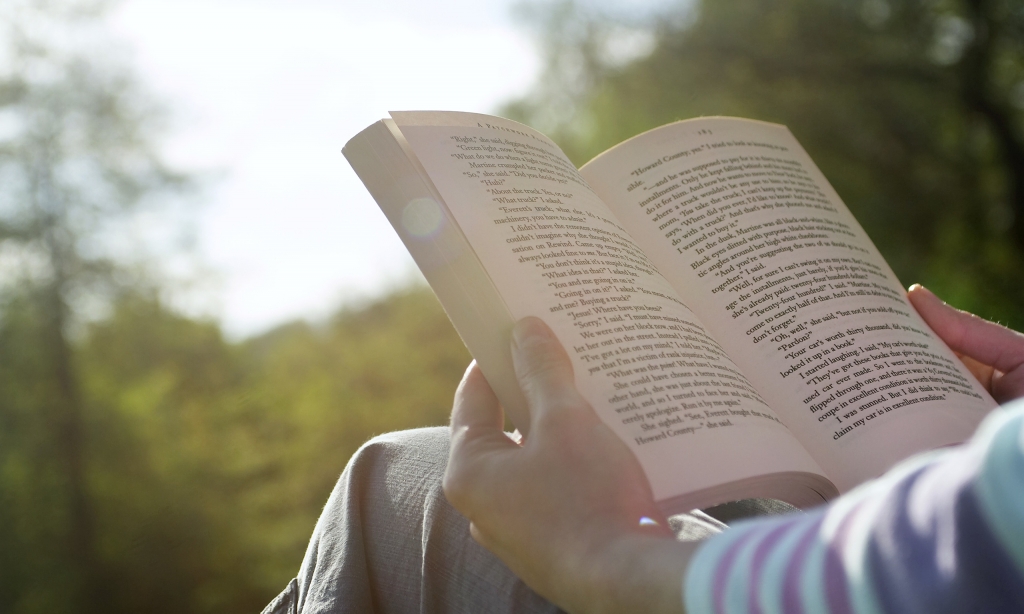 Also abiding in our cultural memory, concerning the need for such poetic experience for education, we find no disagreement between Plato and his pupil, Aristotle, who said in perhaps his greatest work, The Metaphysics, that all knowledge begins in wonder, that is, from the poets. And over a thousand years later, St. Thomas Aquinas says that poetica scientia (poetic knowledge), while not as precise, scientifically, as metaphysics, is the indispensable first degree of knowledge by which we gain a symbolic mode of experience of the highest forms of knowledge and understanding.
Also abiding in our cultural memory, concerning the need for such poetic experience for education, we find no disagreement between Plato and his pupil, Aristotle, who said in perhaps his greatest work, The Metaphysics, that all knowledge begins in wonder, that is, from the poets. And over a thousand years later, St. Thomas Aquinas says that poetica scientia (poetic knowledge), while not as precise, scientifically, as metaphysics, is the indispensable first degree of knowledge by which we gain a symbolic mode of experience of the highest forms of knowledge and understanding.
What does this mean for us, in the English language tradition? Well, what it has always meant-we begin with the rhymes and songs of Mother Goose and Robert Louis Stevenson and selected titles from the thousand good books for children and youth. In spite of all the garbage now on the shelves of libraries and national book stores-relevant and tyrannically “correct” sociology and pop psychology passing itself off as children’s literature-the traditional good books are still in print and even occupy a space in those same libraries and books stores. That’s not the problem. We can get the books. But these books were meant to be read and listened to in a culture appropriate to literature. They presuppose the culture of natural order, ordered to the human order, which includes the dignity of the Greek word for school, “skola”-leisure. So getting the books is the positive act, but there are negative requirements as well: turn off, if not get rid of, the television set, the computer, the stereo, and the video games. Alright, we will compromise: Watch some carefully selected and age-appropriate films, and listen to some equally appropriate recorded music, now and again, knowing, however, that both are technological shadows and echoes from deep within Plato’s New 21st Century Cave.
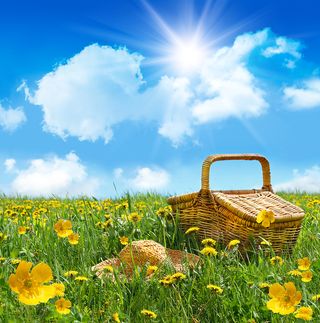 Up into the light from reading these good books, our entry into the “world” of poems and stories is not an escape into a time past, it is a discovery of where we came from, and measure of where we are. Most of all, they depend on a life of a sensory knowledge of the sun, the moon, the stars, a life lived mostly out of doors, of fireplaces in winter, front porches in the summer, of peopled living rooms, and casual conversation around a dinner table, free of rude electronic interruptions. Let us take a collective look outside our front doors, and it should be obvious to anyone who has not already been desensitized by the loss of civility and general crassness, that, for the time being, we have lost the Western cultural war-no matter where we live, we seem to be “in the wrong ‘hood’”. Without an adventurous and courageous Odysseus to contain them, the Cyclopes have left their island-they’re just down the block, perhaps approaching the front steps even now. The least we can do, without becoming cultist or recluse, is to let our cultural memory live again in the home, which will, in turn, strengthen the bar on the door at the same time. Then, as wiser men have said in bad times, wait for better days-not with sad faces, but with the well-groomed secret joy that becomes those who live on the side of the angels.
Up into the light from reading these good books, our entry into the “world” of poems and stories is not an escape into a time past, it is a discovery of where we came from, and measure of where we are. Most of all, they depend on a life of a sensory knowledge of the sun, the moon, the stars, a life lived mostly out of doors, of fireplaces in winter, front porches in the summer, of peopled living rooms, and casual conversation around a dinner table, free of rude electronic interruptions. Let us take a collective look outside our front doors, and it should be obvious to anyone who has not already been desensitized by the loss of civility and general crassness, that, for the time being, we have lost the Western cultural war-no matter where we live, we seem to be “in the wrong ‘hood’”. Without an adventurous and courageous Odysseus to contain them, the Cyclopes have left their island-they’re just down the block, perhaps approaching the front steps even now. The least we can do, without becoming cultist or recluse, is to let our cultural memory live again in the home, which will, in turn, strengthen the bar on the door at the same time. Then, as wiser men have said in bad times, wait for better days-not with sad faces, but with the well-groomed secret joy that becomes those who live on the side of the angels.
In living, and moving and having something of our being in a home culture, even with its all-too-human fuss and bother, if we but smuggle in something of the simple cargo-sturdy, comfortable furniture, fresh food, home cooked meals, good wine, one set of fine china for special meals, paintings and ancestral portraits on the wall, an old upright piano, acoustic guitar, any non-electric instrument, a time set apart to read aloud before prayers and bedtime-if we but make a welcome hearth for the songs of the Muses, we too will know that even on this earth, now and again, a courage will visit among us in those comforting, beautiful reflections of the permanent things, quite surprising yet strangely familiar for us who are passing to and fro in these playful shadows, and we will begin to see as Odysseus recognized, “something very much like perfection.”

